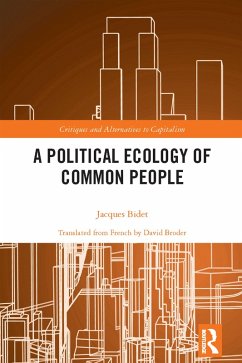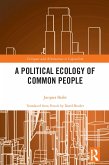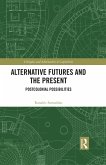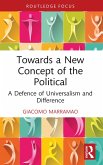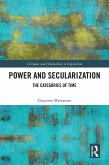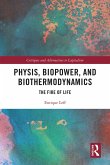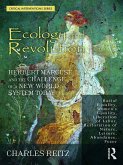Jacques Bidet
A Political Ecology of Common People (eBook, ePUB)
40,95 €
40,95 €
inkl. MwSt.
Sofort per Download lieferbar

20 °P sammeln
40,95 €
Als Download kaufen

40,95 €
inkl. MwSt.
Sofort per Download lieferbar

20 °P sammeln
Jetzt verschenken
Alle Infos zum eBook verschenken
40,95 €
inkl. MwSt.
Sofort per Download lieferbar
Alle Infos zum eBook verschenken

20 °P sammeln
Jacques Bidet
A Political Ecology of Common People (eBook, ePUB)
- Format: ePub
- Merkliste
- Auf die Merkliste
- Bewerten Bewerten
- Teilen
- Produkt teilen
- Produkterinnerung
- Produkterinnerung

Bitte loggen Sie sich zunächst in Ihr Kundenkonto ein oder registrieren Sie sich bei
bücher.de, um das eBook-Abo tolino select nutzen zu können.
Hier können Sie sich einloggen
Hier können Sie sich einloggen
Sie sind bereits eingeloggt. Klicken Sie auf 2. tolino select Abo, um fortzufahren.

Bitte loggen Sie sich zunächst in Ihr Kundenkonto ein oder registrieren Sie sich bei bücher.de, um das eBook-Abo tolino select nutzen zu können.
Advancing the concept of the 'metastructure' to define the relationship between the structural and the symbolic, this book argues that the global ecological crisis has resulted exclusively from processes of social domination, from which it follows that ecological struggle and social struggle are one and the same thing.
- Geräte: eReader
- mit Kopierschutz
- eBook Hilfe
Andere Kunden interessierten sich auch für
![A Political Ecology of Common People (eBook, PDF) A Political Ecology of Common People (eBook, PDF)]() Jacques BidetA Political Ecology of Common People (eBook, PDF)40,95 €
Jacques BidetA Political Ecology of Common People (eBook, PDF)40,95 €![Alternative Futures and the Present (eBook, ePUB) Alternative Futures and the Present (eBook, ePUB)]() Ranabir SamaddarAlternative Futures and the Present (eBook, ePUB)40,95 €
Ranabir SamaddarAlternative Futures and the Present (eBook, ePUB)40,95 €![Towards a New Concept of the Political (eBook, ePUB) Towards a New Concept of the Political (eBook, ePUB)]() Giacomo MarramaoTowards a New Concept of the Political (eBook, ePUB)22,95 €
Giacomo MarramaoTowards a New Concept of the Political (eBook, ePUB)22,95 €![Power and Secularization (eBook, ePUB) Power and Secularization (eBook, ePUB)]() Giacomo MarramaoPower and Secularization (eBook, ePUB)40,95 €
Giacomo MarramaoPower and Secularization (eBook, ePUB)40,95 €![Physis, Biopower, and Biothermodynamics (eBook, ePUB) Physis, Biopower, and Biothermodynamics (eBook, ePUB)]() Enrique LeffPhysis, Biopower, and Biothermodynamics (eBook, ePUB)43,95 €
Enrique LeffPhysis, Biopower, and Biothermodynamics (eBook, ePUB)43,95 €![The Commons (eBook, ePUB) The Commons (eBook, ePUB)]() César RenduelesThe Commons (eBook, ePUB)40,95 €
César RenduelesThe Commons (eBook, ePUB)40,95 €![Ecology and Revolution (eBook, ePUB) Ecology and Revolution (eBook, ePUB)]() Charles ReitzEcology and Revolution (eBook, ePUB)40,95 €
Charles ReitzEcology and Revolution (eBook, ePUB)40,95 €-
-
-
Advancing the concept of the 'metastructure' to define the relationship between the structural and the symbolic, this book argues that the global ecological crisis has resulted exclusively from processes of social domination, from which it follows that ecological struggle and social struggle are one and the same thing.
Hinweis: Dieser Artikel kann nur an eine deutsche Lieferadresse ausgeliefert werden.
Dieser Download kann aus rechtlichen Gründen nur mit Rechnungsadresse in A, B, BG, CY, CZ, D, DK, EW, E, FIN, F, GR, HR, H, IRL, I, LT, L, LR, M, NL, PL, P, R, S, SLO, SK ausgeliefert werden.
Hinweis: Dieser Artikel kann nur an eine deutsche Lieferadresse ausgeliefert werden.
Produktdetails
- Produktdetails
- Verlag: Taylor & Francis eBooks
- Seitenzahl: 192
- Erscheinungstermin: 26. Oktober 2023
- Englisch
- ISBN-13: 9781000962314
- Artikelnr.: 69103356
- Verlag: Taylor & Francis eBooks
- Seitenzahl: 192
- Erscheinungstermin: 26. Oktober 2023
- Englisch
- ISBN-13: 9781000962314
- Artikelnr.: 69103356
- Herstellerkennzeichnung Die Herstellerinformationen sind derzeit nicht verfügbar.
Jacques Bidet is a former professor at the University of Paris-Nanterre, France, and the founder of the journal Actuel Marx. Throughout his research since the 1980s, he has been developing a theory of modern society and history known as a "metastructural theory of modernity", mainly inspired by Marx, in the light of both Althusser and Habermas.
Introduction: What is to be done in the age of disaster?
Preamble: the "metastructural turn"
Part I: Capitalism and the State, the World-System and the Class World-State
1. The Modern Ecological Class Structure
1.1. Capital as a social-ecological fact
1.2. Competence as a social-ecological fact
1.3. The "fundamental" or "popular" class: the class of the "common people"
2. Class Violence and National Violence
2.1. The nation-state and its regimes of hegemony
2.2. From the Nation to the System of Nations
2.3. The political intertwining of class-colony/gender
3. World-System, World-State, World-Nation
3.1. The Nation-State within the World-System
3.2. Beyond the World-System: the World-State
3.3. Towards the World-Nation?
Part II: Citizens of a World-Nation, Residents of the Planet
4. Social Domination Alone Is Destroying the Planet
4.1. The order of battle
4.2. Unthought aspects of productivism and consumerism
4.3. On the right and proper use of the planet
5. Only Struggles for Liberation Can Protect the Planet
5.1. Class struggles as ecological struggles
5.2. Gender and Global-South struggles as ecological struggles
6. The World-Nation, the Ultimate Ecological Community
6.1. The nation as the ultimate figure of the common
6.2. Humanity, the ultimate nation
6.3. A national politics for humanity
6.4. Epilogue: a community of the living?
Preamble: the "metastructural turn"
Part I: Capitalism and the State, the World-System and the Class World-State
1. The Modern Ecological Class Structure
1.1. Capital as a social-ecological fact
1.2. Competence as a social-ecological fact
1.3. The "fundamental" or "popular" class: the class of the "common people"
2. Class Violence and National Violence
2.1. The nation-state and its regimes of hegemony
2.2. From the Nation to the System of Nations
2.3. The political intertwining of class-colony/gender
3. World-System, World-State, World-Nation
3.1. The Nation-State within the World-System
3.2. Beyond the World-System: the World-State
3.3. Towards the World-Nation?
Part II: Citizens of a World-Nation, Residents of the Planet
4. Social Domination Alone Is Destroying the Planet
4.1. The order of battle
4.2. Unthought aspects of productivism and consumerism
4.3. On the right and proper use of the planet
5. Only Struggles for Liberation Can Protect the Planet
5.1. Class struggles as ecological struggles
5.2. Gender and Global-South struggles as ecological struggles
6. The World-Nation, the Ultimate Ecological Community
6.1. The nation as the ultimate figure of the common
6.2. Humanity, the ultimate nation
6.3. A national politics for humanity
6.4. Epilogue: a community of the living?
Introduction: What is to be done in the age of disaster?
Preamble: the "metastructural turn"
Part I: Capitalism and the State, the World-System and the Class
World-State
1. The Modern Ecological Class Structure
1.1. Capital as a social-ecological fact
1.2. Competence as a social-ecological fact
1.3. The "fundamental" or "popular" class: the class of the "common people"
2. Class Violence and National Violence
2.1. The nation-state and its regimes of hegemony
2.2. From the Nation to the System of Nations
2.3. The political intertwining of class-colony/gender
3. World-System, World-State, World-Nation
3.1. The Nation-State within the World-System
3.2. Beyond the World-System: the World-State
3.3. Towards the World-Nation?
Part II: Citizens of a World-Nation, Residents of the Planet
4. Social Domination Alone Is Destroying the Planet
4.1. The order of battle
4.2. Unthought aspects of productivism and consumerism
4.3. On the right and proper use of the planet
5. Only Struggles for Liberation Can Protect the Planet
5.1. Class struggles as ecological struggles
5.2. Gender and Global-South struggles as ecological struggles
6. The World-Nation, the Ultimate Ecological Community
6.1. The nation as the ultimate figure of the common
6.2. Humanity, the ultimate nation
6.3. A national politics for humanity
6.4. Epilogue: a community of the living?
Preamble: the "metastructural turn"
Part I: Capitalism and the State, the World-System and the Class
World-State
1. The Modern Ecological Class Structure
1.1. Capital as a social-ecological fact
1.2. Competence as a social-ecological fact
1.3. The "fundamental" or "popular" class: the class of the "common people"
2. Class Violence and National Violence
2.1. The nation-state and its regimes of hegemony
2.2. From the Nation to the System of Nations
2.3. The political intertwining of class-colony/gender
3. World-System, World-State, World-Nation
3.1. The Nation-State within the World-System
3.2. Beyond the World-System: the World-State
3.3. Towards the World-Nation?
Part II: Citizens of a World-Nation, Residents of the Planet
4. Social Domination Alone Is Destroying the Planet
4.1. The order of battle
4.2. Unthought aspects of productivism and consumerism
4.3. On the right and proper use of the planet
5. Only Struggles for Liberation Can Protect the Planet
5.1. Class struggles as ecological struggles
5.2. Gender and Global-South struggles as ecological struggles
6. The World-Nation, the Ultimate Ecological Community
6.1. The nation as the ultimate figure of the common
6.2. Humanity, the ultimate nation
6.3. A national politics for humanity
6.4. Epilogue: a community of the living?
Introduction: What is to be done in the age of disaster?
Preamble: the "metastructural turn"
Part I: Capitalism and the State, the World-System and the Class World-State
1. The Modern Ecological Class Structure
1.1. Capital as a social-ecological fact
1.2. Competence as a social-ecological fact
1.3. The "fundamental" or "popular" class: the class of the "common people"
2. Class Violence and National Violence
2.1. The nation-state and its regimes of hegemony
2.2. From the Nation to the System of Nations
2.3. The political intertwining of class-colony/gender
3. World-System, World-State, World-Nation
3.1. The Nation-State within the World-System
3.2. Beyond the World-System: the World-State
3.3. Towards the World-Nation?
Part II: Citizens of a World-Nation, Residents of the Planet
4. Social Domination Alone Is Destroying the Planet
4.1. The order of battle
4.2. Unthought aspects of productivism and consumerism
4.3. On the right and proper use of the planet
5. Only Struggles for Liberation Can Protect the Planet
5.1. Class struggles as ecological struggles
5.2. Gender and Global-South struggles as ecological struggles
6. The World-Nation, the Ultimate Ecological Community
6.1. The nation as the ultimate figure of the common
6.2. Humanity, the ultimate nation
6.3. A national politics for humanity
6.4. Epilogue: a community of the living?
Preamble: the "metastructural turn"
Part I: Capitalism and the State, the World-System and the Class World-State
1. The Modern Ecological Class Structure
1.1. Capital as a social-ecological fact
1.2. Competence as a social-ecological fact
1.3. The "fundamental" or "popular" class: the class of the "common people"
2. Class Violence and National Violence
2.1. The nation-state and its regimes of hegemony
2.2. From the Nation to the System of Nations
2.3. The political intertwining of class-colony/gender
3. World-System, World-State, World-Nation
3.1. The Nation-State within the World-System
3.2. Beyond the World-System: the World-State
3.3. Towards the World-Nation?
Part II: Citizens of a World-Nation, Residents of the Planet
4. Social Domination Alone Is Destroying the Planet
4.1. The order of battle
4.2. Unthought aspects of productivism and consumerism
4.3. On the right and proper use of the planet
5. Only Struggles for Liberation Can Protect the Planet
5.1. Class struggles as ecological struggles
5.2. Gender and Global-South struggles as ecological struggles
6. The World-Nation, the Ultimate Ecological Community
6.1. The nation as the ultimate figure of the common
6.2. Humanity, the ultimate nation
6.3. A national politics for humanity
6.4. Epilogue: a community of the living?
Introduction: What is to be done in the age of disaster?
Preamble: the "metastructural turn"
Part I: Capitalism and the State, the World-System and the Class
World-State
1. The Modern Ecological Class Structure
1.1. Capital as a social-ecological fact
1.2. Competence as a social-ecological fact
1.3. The "fundamental" or "popular" class: the class of the "common people"
2. Class Violence and National Violence
2.1. The nation-state and its regimes of hegemony
2.2. From the Nation to the System of Nations
2.3. The political intertwining of class-colony/gender
3. World-System, World-State, World-Nation
3.1. The Nation-State within the World-System
3.2. Beyond the World-System: the World-State
3.3. Towards the World-Nation?
Part II: Citizens of a World-Nation, Residents of the Planet
4. Social Domination Alone Is Destroying the Planet
4.1. The order of battle
4.2. Unthought aspects of productivism and consumerism
4.3. On the right and proper use of the planet
5. Only Struggles for Liberation Can Protect the Planet
5.1. Class struggles as ecological struggles
5.2. Gender and Global-South struggles as ecological struggles
6. The World-Nation, the Ultimate Ecological Community
6.1. The nation as the ultimate figure of the common
6.2. Humanity, the ultimate nation
6.3. A national politics for humanity
6.4. Epilogue: a community of the living?
Preamble: the "metastructural turn"
Part I: Capitalism and the State, the World-System and the Class
World-State
1. The Modern Ecological Class Structure
1.1. Capital as a social-ecological fact
1.2. Competence as a social-ecological fact
1.3. The "fundamental" or "popular" class: the class of the "common people"
2. Class Violence and National Violence
2.1. The nation-state and its regimes of hegemony
2.2. From the Nation to the System of Nations
2.3. The political intertwining of class-colony/gender
3. World-System, World-State, World-Nation
3.1. The Nation-State within the World-System
3.2. Beyond the World-System: the World-State
3.3. Towards the World-Nation?
Part II: Citizens of a World-Nation, Residents of the Planet
4. Social Domination Alone Is Destroying the Planet
4.1. The order of battle
4.2. Unthought aspects of productivism and consumerism
4.3. On the right and proper use of the planet
5. Only Struggles for Liberation Can Protect the Planet
5.1. Class struggles as ecological struggles
5.2. Gender and Global-South struggles as ecological struggles
6. The World-Nation, the Ultimate Ecological Community
6.1. The nation as the ultimate figure of the common
6.2. Humanity, the ultimate nation
6.3. A national politics for humanity
6.4. Epilogue: a community of the living?
